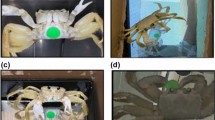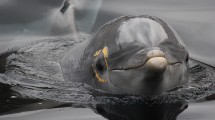Abstract
Since the pioneering work in chimpanzees, mirror self-recognition (MSR), the ability to recognise oneself in a mirror, has been reported in great apes, Asian elephants, dolphins, and some social birds using the mark test, in which animals that possess MSR touch an imperceptible mark on their own bodies only when a mirror is present. However, giant pandas, which are solitary, failed to pass the mark test, suggesting that MSR evolved solely in highly social animals. In contrast to the increasing evidence of MSR in mammals and birds, little is known about MSR in fish. A Tanganyikan cichlid, Neolamprologus pulcher, is a good candidate for study because these fish live in highly social groups and recognise conspecifics about as rapidly as primates. We examined their responses to a mirror image and tested whether N. pulcher could pass the mark test. When the mirror was first exposed, they stayed in front of the mirror and exhibited aggressive behaviour towards the mirror image. These social behaviours suggested that the focal fish perceived the mirror image as an unfamiliar conspecific. The social responses decreased over the following days, as has generally been the case in animals with MSR. After mark injection, we found no increase in scraping behaviour or prolonged observation of the marked side. These results show a lack of contingency checking and mark-directed behaviours, meaning that N. pulcher failed to pass the mark test and did not recognise their self-image in the mirror.



Similar content being viewed by others
References
Ari C (2011) Encephalization and brain organization of mobulid rays (Myliobatiformes, Elasmobranchii) with ecological perspectives. Open Anat 3:1–13. https://doi.org/10.2174/1877609401103010001
Ari C, D’Agostino DP (2016) Contingency checking and self-directed behaviours in giant manta rays: Do elasmobranchs have self-awareness? J Ethol 34:167–174. https://doi.org/10.1007/s10164-016-0462-z
ASAB/ABS (2014) Guidelines for the treatment of animals in behavioural research and teaching. Anim Behav 99:I–IX
Balzarini V, Taborsky M, Wanner S, Koch F, Frommen JG (2014) Mirror, mirror on the wall: the predictive value of mirror tests for measuring aggression in fish. Behav Ecol Sociobiol 68:871–878. https://doi.org/10.1007/s00265-014-1698-7
Bashine-Earn S, Neat FC, Reid H, Taborsky M (1998) Paying to stay or paying to breed? Field evidence for direct benefits of helping behaviour in a cooperatively breeding fish. Behav Ecol 9:432–438. https://doi.org/10.1093/beheco/9.5.432
Beckoff M, Sherman PW (2004) Reflections on animal selves. Trends Ecol Evol 19:176–180. https://doi.org/10.1016/j.tree.2003.12.010
Brown C, Laland K, Krause J (2011) Fish cognition and behaviour. Wiley, Oxford
Bshary R, Gingins S, Vail AL (2014) Social cognition in fishes. Trends Cogn Sci 18(9):465–471
Byrne RW (1995) The thinking ape: evolutionary origins of intelligence. Oxford University Press, Oxford
Cattelan S, Lucon-Xiccato T, Pilastro A, Griggio M (2017) Is the mirror test a valid measure of fish sociability? Anim Behav 127:109–116. https://doi.org/10.1016/j.anbehav.2017.03.009
Clary D, Kelly DM (2016) Graded mirror self-recognition by Clark’s nutcrackers. Sci Rep 6:36459. https://doi.org/10.1038/srep36459
Cohen J (1988) Statistical power analysis for the behavioural sciences. Lawrence Earlbaum Associates, Hillside
de Veer MW, van den Bos R (1999) A critical review of methodology and interpretation of mirror self-recognition research in nonhuman primates. Anim Behav 58:459–468. https://doi.org/10.1006/anbe.1999.1166
Delfour F, Marten K (2001) Mirror image processing in three mammal species: killer whales (Orcinus orca), false killer whales (Pseudorca crassidens) and California sea lions (Zalophus californianus). Behav Process 53:181–190. https://doi.org/10.1016/S0376-6357(01)00134-6
Desjardins JK, Fernald RD (2010) What do fish make of mirror images? Biol Lett 6:744–747. https://doi.org/10.1098/rsbl.2010.0247
Devue C, Brédart S (2011) The neural correlates of visual self-recognition. Conscious Cognit 20:40–51. https://doi.org/10.1016/j.concog.2010.09.007
Frederick JL (1997) Evaluation of fluorescent elastomer injection as a method for marking small fish. Bull Marine Sci 69:399–408
Furtbauer I, King AJ, Heistermann M (2015) Visible implant elastomer (VIE) tagging and simulated predation risk elicit similar physiological stress response in three-spined stickleback Gasterosteus aculeatus. J Fish Biol 86:1644–1649. https://doi.org/10.1111/jfb.12662
Gallup GG (1970) Chimpanzees: self-recognition. Science 167:86–87. https://doi.org/10.1093/oxfordhb/9780199548019.003.0004
Gallup GG (1977) Absence of self-recognition in a monkey (Macaca fascicularis) following prolonged exposure to a mirror. Dev Psychobiol 10:281–284. https://doi.org/10.1002/dev.420100312
Gallup GG (1998) Self-awareness and the evolution of social intelligence. Behav Process 42:239–247. https://doi.org/10.1016/S0376-6357(97)00079-X
Gallup GG, McClure MK, Hill SD, Bundy RA (1971) Capacity of self-recognition in differentially reared chimpanzees. Psychol Rec 21:69–74
Gatto E, Lucon-Xiccato T, Savasci BB, Dadda M, Bisazza A (2017) Experimental setting affects the performance of guppies in a numerical discrimination task. Anim Cogn 20:187–198. https://doi.org/10.1007/s10071-016-1037-7
Gonzalez-Voyer A, Winberg S, Kolm N (2009) Social fishes and single mothers: brain evolution in African cichlids. Proc R Soc B Biol Sci 276:161–167. https://doi.org/10.1098/rspb.2008.0979
Groenewoud F, Frommen JG, Josi D, Tanaka H, Jungwirth A, Taborsky M (2016) Predation risk drives social complexity in cooperative breeders. Proc Natl Acad Sci USA 113:4104–4109. https://doi.org/10.1073/pnas.1524178113
Horowitz A (2017) Smelling themselves: dogs investigate their own odours longer when modified in an “olfactory mirror” test. Behav Processes 143:17–24. https://doi.org/10.1016/j.beproc.2017.08.001
Jerison HJ, Jerison I (1988) The evolutionary biology of intelligence. Nato ASI series in ecology. Springer, New York
Kohda M, Jordan LA, Hotta T, Kosaka N, Karino K, Tanaka H, Taniyama M, Takeyama T (2015) Facial recognition in a group-living cichlid. PLoS ONE 10:e0142552. https://doi.org/10.1371/journal.pone.0142552
Kroeger RHH, Bowmaker JK, Wagner HJ (1999) Morphological changes in the retina of Aequidens pulcher (Cichlidae) after rearing in monochromatic light. Vision Res 39:2411–2448. https://doi.org/10.1016/S0042-6989(98)00256-9
Kusayama T, Ikeda Y, Irie N, Chin H, Tsubokawa T, Takeno J, Sakai M (2012) Reminiscences about mirror self-recognition. Jpn J Anim Psychol 62:111–124. https://doi.org/10.2502/janip.62.1.9
Lefebvre L, Reader SM, Sol D (2004) Brains, innovations and evolution in birds and primates. Brain Behav Evol 63:233–246. https://doi.org/10.1159/000076784
Lucon-Xiccato T, Bisazza A (2017) Individual differences in cognition among teleost fishes. Behav Process 141:184–195. https://doi.org/10.1016/j.beproc.2017.01.015
Ma X, Jin Y, Luo B, Zhang G, Wei R, Liu D (2015) Giant pandas failed to show mirror self-recognition. Anim Cogn 18:713–721. https://doi.org/10.1007/s10071-015-0838-4
Mitchell RW (1997) A comparison of the self-awareness and kinesthetic–visual matching theories of self-recognition: autistic children and others. Ann New York Acad Sci 818:39–62. https://doi.org/10.1111/j.1749-6632.1997.tb48245.x
Moretz JA, Martins EP, Robinson BD (2006) The effects of early and adult social environment on zebrafish (Danio rerio) behaviour. Environ Biol Fishes 80:91–101. https://doi.org/10.1007/s10641-006-9122-4
Mousavi SM, Nasab EM, Yavari V, Ghatrami ER, Jalali MR (2012) Effects of two anaesthetic regimes, MS-222 and eugenol, on plasma biochemical profile in Barbus sharpeyi. Comp Clin Pathol 21:859–863. https://doi.org/10.1007/s00580-011-1189-4
Oliveira RF, La C, Canario AVM (2005) Behavioural endocrinology: no hormonal response in tied fights. Nature 437:207–208. https://doi.org/10.1038/437207a
Parker ST, Mitchell RW, Boccia ML (1994) Self-awareness in animals and humans: developmental perspectives. Cambridge University Press, New York
Parry JWL, Carleton KL, Spady T, Carboo A, Hunt DM, Bowmaker JK (2005) Mix and match color vision: tuning spectral sensitivity by differential opsin gene expression in Lake Malawi Cichlids. Curr Biol 15:1734–1739. https://doi.org/10.1016/j.cub.2005.08.010
Plotnik JM, de Waal FBM, Reiss D (2006) Self-recognition in an Asian elephant. Proc Natl Acad Sci USA 103:17053–17057. https://doi.org/10.1073/pnas.0608062103
Premack D, Woodruff G (1978) Does the chimpanzee have a theory of mind? Behav Brain Sci 1:515–526. https://doi.org/10.1017/S0140525X00076512
Pretot L, Bshary R, Brosnan SF (2016) Comparing species decisions in a dichotomous choice task: adjusting task parameters improves performance in monkeys. Anim Cogn 19:819–834. https://doi.org/10.1007/s10071-016-0981-6
Prior H, Schwarz A, Gunturkun O (2008) Mirror-induced behaviour in the magpie (Pica pica): evidence of self-recognition. PLoS Biol 6(8):e202. https://doi.org/10.1371/journal.pbio.0060202
Reddon AR, O’Conner CM, Marsh-Rollo SE, Bakshine S (2012) Effects of isolation on social response in a cooperatively breeding fish. Anim Behav 84:753–760
Reiss D, Marino L (2001) Mirror self-recognition in the bottlenose dolphin: a case of cognitive convergence. Proc Natl Acad Sci USA 98:5937–5942. https://doi.org/10.1037/pnas.101086398
Riebli T, Taborsky M, Chervet N, Apolloni N, Zurcher Y, Heg D (2012) Behavioural type, status and social context affect behaviour and resource allocation in cooperatively breeding cichlids. Anim Behav 84:925–936. https://doi.org/10.1016/j.anbehav.2012.07.017
Salwiczek LH, Pretot L, Demarta L, Proctor D, Essler J, Pinto AI, Wismer S, Stoinski T, Brosnan SF, Bshary R (2012) Adult cleaner wrasse outperform capuchin monkeys, chimpanzees and orang-utans in a complex foraging task derived from cleaner-client reef cooperation. PLoS ONE 7:e49068. https://doi.org/10.1371/journal.pone.0049068
Sarko D, Marino L, Reiss D (2002) A bottlenose dolphin’s (Tursiops truncates) responses to its mirror image: further analysis. Int J Comp Psychol 15:69–76
Shillito DJ, Gallup GG, Beck B (1999) Factors affecting mirror behaviour in western lowland gorillas, Gorilla gorilla. Anim Behav 57:999–1004. https://doi.org/10.1006/anbe.1998.1062
Sogawa S, Ota K, Kohda M (2016) A dear enemy relationship in a territorial cichlid: evidence for the threat-level hypothesis. Behaviour 153:387–400. https://doi.org/10.1163/1568539X-00003351
Soler M, Perez-Contreras T, Peralta-Sanchez JM (2014) Mirror-mark tests performed on jackdaws reveal potential methodological problems in the use of stickers in avian mark-test studies. PLoS ONE 9(1):e86193. https://doi.org/10.1371/journal.pone.0086193
Stewart JD, Stevens GMW, Marshall GJ, Abernathy K (2017) Are mantas self aware or simply social? A response to Ari and D’Agostino 2016. J Ethol 35:145–147. https://doi.org/10.1007/s10164-016-0491-7
Suarez SD, Gordon G, Gallup GG (1981) Self-recognition in chimpanzees and orangutans, but not gorillas. J Hum Evol 11:239–244. https://doi.org/10.1016/S0047-2484(81)80016-4
Suddendorf T, Butler DL (2013) The nature of visual self-recognition. Trends Cognit Sci 17:121–127. https://doi.org/10.1016/j.tics.2013.01.004
Thunken T, Waltschyk N, Bakker TCM, Kullmann H (2009) Olfactory self-recognition in a cichlid fish. Anim Cogn 12:717–724. https://doi.org/10.1007/s10071-009-0231-2
Vollestad LA, Quinn TP (2003) Trade-off between growth rate and aggression in juvenile coho salmon, Oncorhynchus kisutch. Anim Behav 66:561–568. https://doi.org/10.1006/anbe.2003.2237
Walraven van Elsacker L, Verheyen R (1995) Reactions of a group of pygmy chimpanzees (Pan paniscus) to their mirror images: evidence of self-recognition. Primates 36:145–150. https://doi.org/10.1007/BF02381922
Weber RA, Peleteiro JB, Garcia Martin LO, Aldegunde M (2009) The efficacy of 2-phenoxyethanol, metomidate, clove oil and MS-222 as anaesthetic agents in the Senegalese sole (Solea senegalensis Kaup 1858). Aquaculture 288:147–150. https://doi.org/10.1016/j.aquaculture.2008.11.024
Wong M, Balshine S (2010) Fight for your breeding right: hierarchy re-establishment predicts aggression in a social queue. Biol Lett. https://doi.org/10.1098/rsbl.2010.0639
Yang H (2005) On the uniqueness of self-face recognition. Psychol Sci 28:1517–1519
Acknowledgements
We thank the members of the Laboratory of Animal Sociology, Osaka City University, for their fruitful discussion regarding this work. This study was financially supported by KAKENHI (Nos. 16H05773 and 17K18712) to MK and (No. H16J09486) to TH from JSPS. The English in this document has been checked by at least two professional editors, both native speakers of English. For a certificate, see: http://www.textcheck.com/certificate/index/R1wM76.
Author information
Authors and Affiliations
Corresponding author
Ethics declarations
Conflict of interest
The authors declare that they have no conflict of interest.
Ethical approval
All experiments adhered to the Association for the Study of Animal Behaviours Guidelines for the Use of Animals in Research (ASAB/ABS 2014) and were conducted in compliance with the Regulations on Animal Experiments of Osaka City University and the Japan Ethological Society. No permits from the Japanese government were needed for experiments involving N. pulcher.
Data availability
The raw data for each individual fish have been made available in supplementary material to this publication.
Electronic supplementary material
Below is the link to the electronic supplementary material.
Rights and permissions
About this article
Cite this article
Hotta, T., Komiyama, S. & Kohda, M. A social cichlid fish failed to pass the mark test. Anim Cogn 21, 127–136 (2018). https://doi.org/10.1007/s10071-017-1146-y
Received:
Revised:
Accepted:
Published:
Issue Date:
DOI: https://doi.org/10.1007/s10071-017-1146-y




